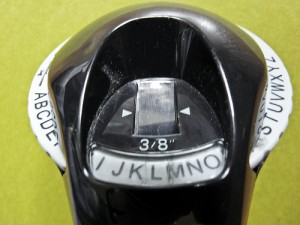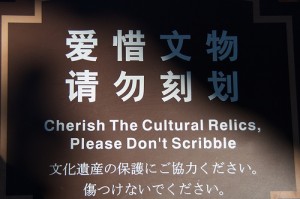 There is a wonderful collection of images over on Flickr collected by a group called “Writing Machines.” It is easy to forget just how many different styles of typewriters existed before things went electronic and now digital. You can explore the group’s pool of images here.
There is a wonderful collection of images over on Flickr collected by a group called “Writing Machines.” It is easy to forget just how many different styles of typewriters existed before things went electronic and now digital. You can explore the group’s pool of images here.

I often apologize to people about my messy writing. In fact, long ago, I determined that it could basically write in code if I just, well, wrote. It seems like good penmanship (penwomanship?), is going the way of the dodo, according to a recent Associated Press article, “Cursive writing may be a fading skill, but so what?” My own handwriting may well beg the question as to whether or not the education system ever taught writing past the third grade, but is this a skill that children need to prove their good character in the future? Does handwriting only matter when we are without electricity or a decent charge in our laptop or our cellphone (or other texting device)?
A better pencil
There is a interesting short interview over on Salon with Dennis Baron, author of A Better Pencil. In his book, Baron looks back across history at how every advancement in communications has been met with a level of fear and suspicion, particularly from those who are strongly invested in the medium that is being displaced by the new one. At the heart of this reaction, according to Barron, are issues of power and control:
” The more people use technology, the more people communicate, the more people in power become concerned with how to control that use. There are two forces pushing against each other. Whether it’s government or religious organizations or schools controlling what children do online or parents controlling what their kids are doing with communication technologies or groups online self-organizing and deciding how to control what does and does not get expressed — it’s similar to what happened when printing presses became a major means of communication or when radio and TV became major communication players. How do you license, how do you control what gets said on the air?”
Smell of books
Hi all,
The Papyrus to Cyberspace broadcast raises a host of issues relating to our long-term relationship with books and the anxiety provoked by the idea of leaving behind books as objects to be flipped through, fondled and, well, smelled. We may be able to carry a thousand books on a Kindle or read pages of our favourite newspaper on small little screens, but do we get the full aesthetic experience of musty old paper or wet newsprint? To respond to the sterile nature of electronic books, the fine folks at smellofbooks.com have developed some products to help us deal with loss of B.O. (book odour). Check out their aerosol e-book enhancer on their website!

Johnson’s Dictionary
– photo: Jeff Miller
The book that influenced all others
Henry Hitchings, author of the 2005 book Dr Johnson’s Dictionary: The Extraordinary Story of the Book that Defined the World, describes how Johnson’s working method was innovative.
“He started not by coming up with a list of words like previous compilers had, but by reading 2,000 books. When he saw words that were interesting, he marked notes on them in the margin. So usage became his primary criterion and he had at least one quotation for each word.”
Samuel Johnson also brought elegance to his definitions. Whereas [earlier lexicographer Nathan] Bailey described a wheel as “a round device too well known to need description”, and a spider as “an insect well known”, Johnson defined a wheel as “a circular body that turns round upon an axis”, and a spider as “the animal that spins webs for flies”.
Johnson defined a trance as “a temporary absence of the soul”, and a rant as “high sounding language unsupported by dignity of thought”.
– Brian
Well, maybe this post won’t quite work as the devastating defense of the dread spectre of technological determinism that I hope to write one day. But having heard the line “technology isn’t important” in discussions amongst educational technologists so many times I certainly find myself nodding in agreement with Martin Weller here… As has been said before, read the whole thing, but in the interim a few choice morsels:
…technology often doesn’t succeed because we ignore all the stuff around it – the administrative context it operates within, the time people have to use it, how it makes people feel about their jobs, etc. I know all this stuff, but what ‘the technology isn’t important’ people often really mean is ‘I want to ignore technology’. And that is surely the wrong way to go.
…from my perspective the technology isn’t important argument is used as a justification to disregard anything technologically driven and hopefully carry on as we’ve always done. In this context suggesting that technology isn’t important is irresponsible. I’m sure plenty of journalists argued that technology wasn’t important, it’s quality reporting that counts. That didn’t stop technology completely transforming their industry. And I’m sure post-Gutenberg we heard arguments that ‘printing isn’t important, it’s what’s in the Bible that counts’. And when Brunel was busy laying railway lines I’m sure horse-drawn carriage owners insisted that ‘the railway isn’t significant, it’s staying in nice inns that we should focus on’.
It’s true enough that we can get too excited by the bells and whistles of the latest techie doo-dads, but I think Martin’s post suggests we can do better when promoting the human dimension of our practice.
— Brian
Hyperwords
Here’s an interesting Firefox add-on I just found.
http://www.hyperwords.net/index.html
What you should notice if you explore some of the material on the site is that it attempts to build upon Doug Engelbart’s work!
Hypertext: Edge-notched cards
The New York Times ran an interesting articleon June 17th, about Paul Otlet, a Belgian library who some claim may have invented one of the first models of a hypertextual system as well as theorized a networked system that bears some resemblance to what we now see as the world wide web. As we delve into some the history of hypertext in Module 4, it is interesting to consider Otlet’s work, which dates from the late 19th century.
You may need to have a “free” account with the NYT to view the article:
http://www.nytimes.com/2008/06/17/science/17mund.html?pagewanted=1&8dpc&_r=1
I use this video with Teachers and Teacher Librarians when I am trying to stress the importance of information literacies and our need to understand them. Hope no one has posted it earlier.
Michael Wesch is Assistant Professor of Cultural Anthropology at Kansas State University.
[youtube]https://www.youtube.com/watch?v=6gmP4nk0EOE[/youtube]
Deb
ANIMOTO
Here is a great little resource that seems to be of great interest in my aggregator these days. ANIMOTO is a web based digital media generator that is quick and easy to use with impressive results.
Deb
